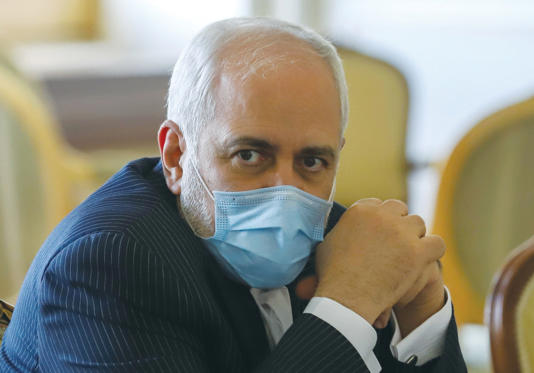
On August 16, US Secretary of State Antony Blinken released a video address commemorating the 80th anniversary of the Bialystok Ghetto uprising. Blinken’s late stepfather, Samuel Pisar, participated in the revolt, which was one of the most significant acts of Jewish resistance against Nazi Germans.
The statement by a somber-looking Blinken referenced Jewish acts of “bravery” while also disclosing plans by the Biden administration to secure $1 million for establishing a “virtual tour of Auschwitz-Birkenau so that more people who can’t visit can experience the indelible impact of seeing the site.”
Efforts by Blinken and US President Joe Biden to invest in Holocaust education are laudable endeavors aimed at preserving the memory of the Shoah. Yet undergirding Blinken’s words was the administration’s announcement, less than a week earlier, that the US would unfreeze $6 billion of Iranian funds, previously held in South Korea, along with five Iranian prisoners – in exchange for five US hostages.
That Biden has spent his time in office courting an Islamic regime intent on “wiping out Israel” while also promoting a new Holocaust project is not surprising. For years, many on the Left have defaulted to a horrifying time in Jewish history and appropriated the Holocaust as a tool for Jewish placation – while simultaneously advancing policies that imperil the lives of Jews living today.
The corresponding announcements from earlier this summer proceed along a predictable pattern beginning under former US president Jimmy Carter of using the Holocaust as a foil for reorienting geopolitical dynamics against Israel. Comparisons are often made between the 39th president and America’s current leader, whose failures in foreign policy have led to America’s weakening influence abroad.
Former US President Jimmy Carter reacts as his wife Rosalynn Carter (not pictured) speaks during a reception to celebrate their 75th wedding anniversary in Plains, Georgia, US, July 10, 2021. (credit: JOHN BAZEMORE/POOL VIA REUTERS/FILE PHOTO)
Writing in National Affairs, noted scholar Prof. Ruth Wisse details how it was officials within the Carter administration who initially pitched the idea of establishing a National Holocaust Museum when relations between president Carter and the broader Jewish community were at an all-time low. Wisse notes how Carter went public with his support for the plan after upsetting US Jewish leaders by approving the sale of F-15 fighter planes to Saudi Arabia and endorsing the creation of a Palestinian state.
Like Carter, Biden calculates references to remembering the six million Jews who perished in the Holocaust around accelerating diplomatic maneuvers that risk destroying six million more. The president has made reviving the 2015 Iran nuclear deal, officially known as the Joint Comprehensive Plan of Action (JCPOA), a cornerstone of his foreign policy agenda. Most disturbing are reports citing that the recent $6 billion deal represents only a sliver of the approximately $20 billion Iran will receive in a new “mini-deal” involving its nuclear program.
While problematic, Carter’s decision decades ago dims in comparison to the fatal consequences Israel will face should Iran acquire a nuclear weapon.
Liberal failure
Sadly, too many liberals are seduced into falling for the faulty paradigm under which Jews are systemically viewed through the prism of victimization. To date, few Jewish organizations are lobbying against the Biden administration renewing an agreement with Iran. On the contrary, a 2015 Los Angeles Jewish Journal survey found “when compared to Americans generally,” US Jews were more supportive of the Iran deal.”
Iranian leaders’ repackaging semantics and supplanting the phrase “Zionist enemy” for the “Jewish enemy” coheres with the rising disassociation of Democrats from Israel by conflating anti-Zionism with antisemitism.
Retaining focus on the dangers posed to Jews 80 years ago offers an alternative to those dismissive of threats equally as destructive circling today.
Even with the level of resources and attention devoted to Holocaust remembrance, there exists little to no pushback against the Biden administration appeasing a regime that repeatedly engages in Holocaust denial and pulls its threats to exterminate Jews right out of Nazi Germany’s playbook. In a 2020 tweet, then-Iranian foreign minister Javad Zarif used Hitler’s term for genocide by threatening to impose the “Final Solution” against the Jews.
In addition, officials within the Islamic regime repeatedly employ language denying that the Holocaust ever happened, with Iranian Supreme Leader Ali Khamenei calling the Holocaust “a myth.” In 2017, Saudi Arabia’s Crown Prince Mohammed bin Salman (MBS) warned the world of Iran’s rising danger, referring to Khamenei as the “new Hitler” of the Middle East.
If the Biden administration were serious in sanctifying Holocaust memory, it would cease emboldening a government that propagates plans to murder millions of Jews. In May, the US president addressed a crowd during Jewish American Heritage Month and spoke about how, as a child around the dinner table, his father shared his regret that America had not acted to save more Jews during World War II. That Biden fails to see how his actions to enrich Iran, whose malicious objectives mirror the horrors deployed by Hitler, underscores a manipulative characterization of regional developments.
The best defense against Jewish weakness is Jewish strength, an ideal that today lies at the core of modern-day Israel.
Over the summer, in a striking reversal from historical atrocities, Israel secured its largest defense contract with Germany, which agreed to purchase the Arrow 3 missile defense system from Israel in a $3.5 billion deal, following US approval.
Commemorating the Holocaust in the absence of acting against Iranian ambitions undermines the memory of those murdered at the hands of the Nazis. Despite the Islamic Republic maintaining a promise to annihilate millions of Jews while also being the main funding source for terrorist groups that have been killing Jews inside Israel for decades, the Biden administration continues to seek avenues in which it can strengthen its leaders and all associated with the regime.
Sincerely confronting the Nazi horrors of the past requires acting to blunt the catastrophes of the future.
Source: The Jerusalem Post

